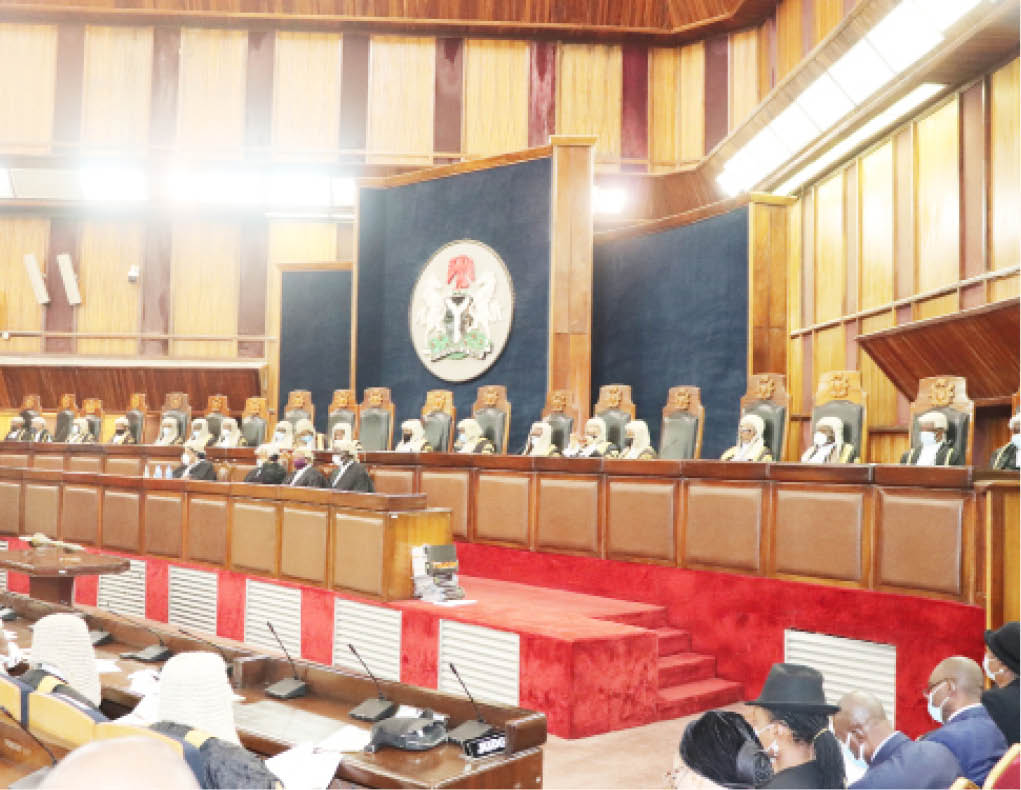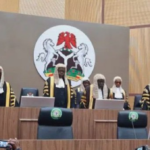The death of Justice Sylvester Ngwuta on March 7 and the retirement of Justice Bode Rhodes-Vivour on March 22 have again altered the composition of the Supreme Court.
Justice Ngwuta, who died in the National Hospital, Abuja, where he was admitted a week earlier, was due to retire on March 30, 2021, when he would have clocked the statutory age of 70.
- COVID-19: FG raises alarm over racketeering of vaccine
- Some Supreme Court decisions no longer make sense — Justice Rhodes-Vivour
While Rhodes-Vivour was the second most senior justice of the apex court and the deputy chairman of the National Judicial Council (NJC), Ngwuta was the third most senior justice of the court.
The departure of the two prominent justices has, therefore, created a constitutional hole at the nation’s highest court, as only 18 justices are left, as against the 21 provided by law.
Section 230 (2) (a) and (b) provides that the Supreme Court shall consist of “the Chief Justice of Nigeria (CJN) and a number of justices not exceeding 21, as may be prescribed by an Act of the National Assembly.”
The Supreme Court had struggled to make up the constitutionally required number. In 2020, the court swore in eight new justices from the Court of Appeal. They are Mohammed Lawal Garba, Helen Morenikeji Ogunwumiju, Abdu Aboki, Ibrahim Saulawa, Adamu Jauro, Samuel Oseji, Tijani Abubakar and Emmanuel Agim.
The senior justices of the court in their order of seniority and date of retirement are Justice Tanko Muhammad, the CJN, who will retire on December 31, 2023, having been born on December 31, 1953. He is followed by Justice Mary Odili, who will be retired on May 12, 2022, having been born on May 12, 1952. She was elevated to the Supreme Court on June 23, 2011.
The third most senior justice is Olukayode Ariwoola, who will retire on August 22, 2030, having been born on August 22, 1958. He was elevated to the Supreme Court on November 22, 2011.
The next justice is Musa Dattijo Muhammad, who will retire on October 27, 2023, having been born on October 27, 1953. He joined the Supreme Court bench in July 2012.
Justice Kudirate Kekere-Ekun will be due for retirement on May 7, 2030, having been born on May 7, 1958. She joined the apex court in July 2013.
Justice Inyang Okoro will be due for retirement on July 11, 2031, having been born on July 11, 1959. He was elevated to the Supreme Court in October 2013.
Justice Centus Nweze is due to retire on September 25, 2030, having been born on September 25, 1958. He joined the apex court in October 2014.
Justice Ejembi Eko is due for retirement on May 23, 2022, having been born on May 23, 1952. He joined the Supreme Court bench on November 7, 2016.
Justice Amina Augie is due to retire on September 3, 2023, having been born on September 3, 1953. She joined the Supreme Court bench on November 7, 2016.
Justice Uwani Abba Aji will be due for retirement on November 7, 2026, having been born on November 7, 1956. She was elevated to the Supreme Court on December 20, 2018.
The latest development means that the Supreme Court, which is left with 18 justices, would further be left with 16 justices in 2022 when Justices Odili and Eko retire.
There are unexpected situations similar to that of Justice Sidi Bage, who, despite having to serve till 2026, voluntarily retired from the apex court to become the Emir of Lafia in Nasarawa State after the demise of Mustapha Agwai I in January 2019.
Reacting, Abdul Mohammed, a Senior Advocate of Nigeria (SAN), said the number of justices of the apex court was not an impediment to justice delivery as the court only needs seven members in some matters and five in others to form a quorum.
“It can only be a constitutional crisis where they are not able to constitute a quorum. Since 1999, this is the first time we are getting close to the number of justices constitutionally required,” he said.
Also speaking on the reduced number of justices of the court, Malachy Nwaekpe, a lawyer, said what is important is for the justices to form a quorum, adding that if there is the need to quickly replace the departing justices, the procedure can be hastened.
“There is no time within which it must be done. The most important thing is to ensure that constitutionally laid down procedures are observed; that is, the NJC nominates, the president approves and the National Assembly confirms,” he said.

 Join Daily Trust WhatsApp Community For Quick Access To News and Happenings Around You.
Join Daily Trust WhatsApp Community For Quick Access To News and Happenings Around You.

